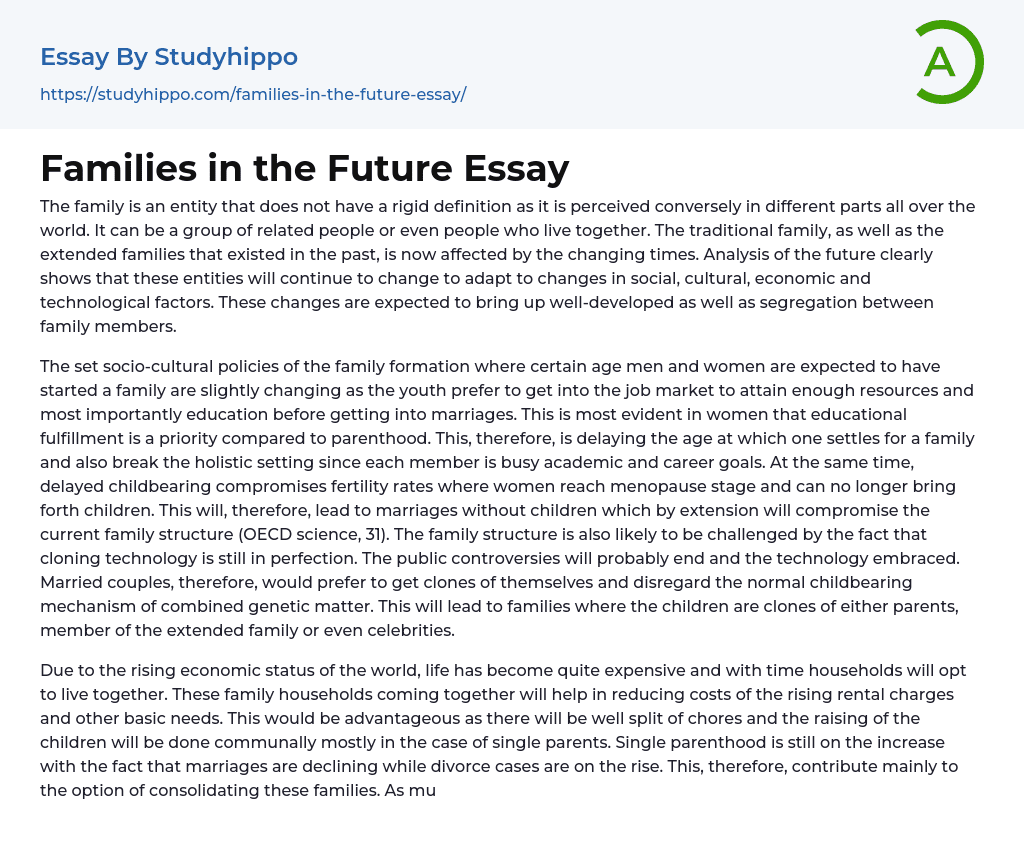The concept of family varies in different parts of the world, as it can be understood in diverse ways. It may refer to a group of relatives or individuals residing together. Both traditional and extended families, which were prevalent in the past, are now influenced by the evolving times. Analysis of the future suggests that these entities will continue to modify themselves in order to accommodate the impacts of social, cultural, economic, and technological advancements. Consequently, these changes are anticipated to result in both improved familial relationships and increased divisions among family members.
The traditional norms surrounding family formation are changing, which used to dictate the timing of starting families for men and women. However, more and more young individuals are now choosing to prioritize their education and enter the job market before getting married in order to obtain sufficient resources. This shift is par
...ticularly noticeable among women who prioritize education over parenthood. As a result, the age at which people settle down and start families is being delayed, disrupting the traditional family structure as each member focuses on academic and career goals.
Moreover, this delay in childbearing also has implications for fertility rates as women may reach menopause before having children. Consequently, there might be an increase in marriages without children, ultimately compromising the current family structure (OECD science, 31).
The advancement of cloning technology will likely challenge the traditional family structure. Ongoing public controversies surrounding this technology are expected to eventually subside, leading to its widespread acceptance. As a result, married couples may choose to bypass the conventional method of conceiving children through combining genetic material and instead opt for cloning themselves. This could giv
rise to families composed of clones of either or both parents, as well as clones of extended family members or even famous individuals. Additionally, with the increasing cost of living globally, households may increasingly choose to live together for economic reasons.
Consolidating family households can help reduce the costs of rising rental charges and basic needs. This is especially advantageous for sharing chores and raising children communally, particularly for single parents. The increase in single parenthood, along with declining marriages and rising divorce rates, primarily contributes to the option of bringing these families together. While cost-effective, there are challenges in forming these non-related households as the sense of care for one another may not be as strong compared to related individuals (OECD science, 68). According to OECD science (30), marriages are declining and many young people prefer cohabitation instead.
The increasing divorce rates are leading to a rise in single parenthood and poverty levels due to the growing economy. Cohabitation, although preferred, can be risky and result in separation. This dissolution of relationships and the increase in children born outside of marriage are contributing factors. However, the future consequences of these trends remain uncertain. It is important to recognize that technological advancements have the potential to ultimately strengthen families.
Social networks have brought together loosely connected families, allowing members to effectively communicate and prevent fragmentation. Advanced medical technologies that aim to improve health will also enhance family life by reducing dependency on sick and elderly family members (OECD Science, 33). These technological, economic, and socio-cultural factors will greatly impact family structure and households. Some changes will have a positive influence on family dynamics, while others may have
negative effects. Therefore, there is a need for policy adjustments to accommodate these evolving structures.
Work Cited
- Oecd Science, Technology and Industry Scoreboard 2011. Paris: Organization for Economic Co-operation and Development, 2011. Print.
- alternative medicine essays
- Aspirin essays
- Cannabis essays
- Cardiology essays
- Cloning essays
- Dentist essays
- drugs essays
- Hemoglobin essays
- Medical essays
- Medical Ethics essays
- Organ Donation essays
- Patient essays
- Pharmacology essays
- Plastic Surgery essays
- Surgery essays
- Therapy essays
- Vaccines essays
- Adoption essays
- Aunt essays
- Babies essays
- Bedroom essays
- Caring essays
- Children essays
- Daughter essays
- Divorce essays
- Dog essays
- Dysfunctional Family essays
- Family Tradition essays
- Family Values essays
- Father essays
- Foster Care essays
- Friends essays
- Grandparent essays
- Home essays
- Hometown essays
- Husband essays
- Jealousy essays
- Love essays
- Marriage essays
- Mother essays
- Online Dating essays
- Parenting essays
- Parenting Teens essays
- Parents essays
- Relationship essays
- Room essays
- Sibling essays
- Sister essays
- Wedding essays
- Wife essays




